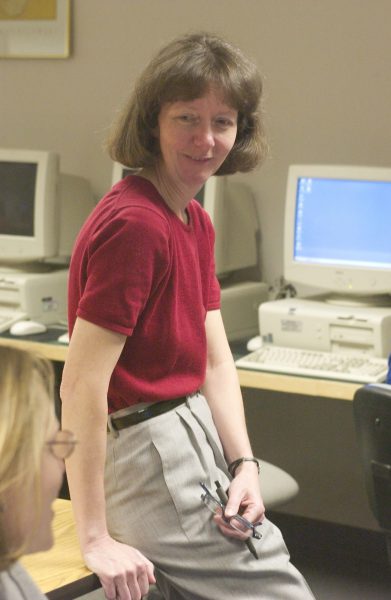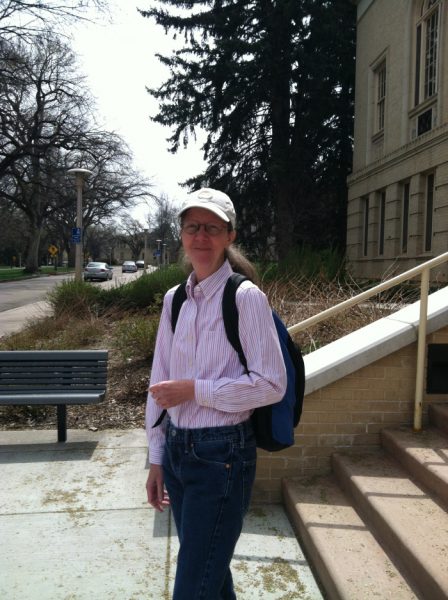
Kate Kiefer joined the English department in 1979, coming from Ohio State and specializing in Composition and Rhetoric. She was hired to supervise the teaching of the newly implemented CO101 — to develop curriculum, provide professional development for GTAs who taught the course, coordinate with Steve Reid — then director of placement — about how many students should be placed into CO101, and meet with students who had questions about their placement.
Kiefer came with a B.A. in both English and Philosophy from the University of Dayton, as well as an M.A. and Ph.D in English from Ohio State University. She initially wanted to teach Philosophy, but it soon became clear to her that there were more teaching opportunities in English so chose to pursue that instead. It turned out to be the right choice, because as she says, “I loved the intensity of my graduate program, and I fell in love with teaching. I was so lucky to get a teaching position when I finished my dissertation at Ohio State, and I had a wonderful career at CSU.”

Kiefer played a key role in establishing the Writing Center the same year she came to CSU, 1979. She would go on to supervise the Writing Center until 2000, seeing a great increase in its responsibilities when CO101 was discontinued and all responsibility for preparing students to write at the college level was transferred onto the Writing Center. In addition to helping found the Writing Center, Kate also worked closely with Charles Smith through the 1980s to expand the presence of computers in the English Department and the Composition curriculum in particular. In 1981, Kiefer helped establish one of the first computer-supported writing labs at a university or college at CSU.
While at CSU, Kiefer was a composition/rhetoric specialist who taught graduate composition theory courses as well as undergraduate composition. She was particularly proud of courses she developed over the years: CO250 (which become CO300), CO301B, E302 (Reading Online), E603 (Computers and Writing), E605 (Reading/Writing Connections), and multiple versions of special topics courses. She developed her long-standing interest and expertise in computers and writing in the early 1980s when she co-founded Computers and Composition. She researched teaching in both physical and virtual computer contexts, resulting in the 1998 publication of Transitions (co-authored with Mike Palmquist and others), as well as publications in Effective Learning and Teaching of Writing and Computers and Composition. She pursued projects in WAC, especially researching commenting practices and professional development for teachers across the curriculum. Towards the end of her time at CSU, her work focused on studying complexity theory and the way in which reading, writing, and thinking can be considered complex adaptive systems.

CSU recognized Kate’s profound dedication to theory/pedagogy connections when, in 2003, she was named a University Distinguished Teaching Scholar. Prior to that she won an Excellence in Teaching Award (1988) and an Alumni Faculty Award (1985). In 2014, Kate Kiefer retired from CSU after 35 years. As a farewell, the department opted out of having everyone sign the traditional “good luck on your retirement” card and instead created an entire blog in her memory — very fitting, considering all she’s done to advance the field of computers and composition, and considering there was no way to fit all our appreciation and love for her into a single paper card.